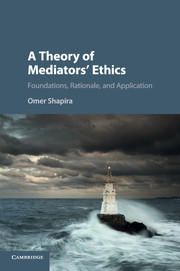Book contents
- Frontmatter
- Dedication
- Contents
- List of figures
- List of tables
- Preface
- Abbreviations of codes of conduct
- PART I A theory of professional ethics
- PART II A theory of mediators’ ethics
- 3 Mediation, mediators’ role, and mediators’ ethics
- 4 Party self-determination
- 5 Mediator competence
- 6 Conflicts of interest
- 7 Mediator impartiality
- 8 Professional integrity
- 9 Diligence, respect and dignity, and honesty
- 10 Confidentiality
- 11 Fairness
- 12 Maintaining the profession's standing and advancement of the profession
- 13 Advertising, solicitation, and mediator fees
- 14 Obligations to employers and principals
- PART III Dealing with ethical problems
- Appendix I A proposed model code of conduct for mediators
- Appendix II Model standards of conduct for mediators (2005)
- Bibliography
- Index
12 - Maintaining the profession's standing and advancement of the profession
from PART II - A theory of mediators’ ethics
Published online by Cambridge University Press: 05 March 2016
- Frontmatter
- Dedication
- Contents
- List of figures
- List of tables
- Preface
- Abbreviations of codes of conduct
- PART I A theory of professional ethics
- PART II A theory of mediators’ ethics
- 3 Mediation, mediators’ role, and mediators’ ethics
- 4 Party self-determination
- 5 Mediator competence
- 6 Conflicts of interest
- 7 Mediator impartiality
- 8 Professional integrity
- 9 Diligence, respect and dignity, and honesty
- 10 Confidentiality
- 11 Fairness
- 12 Maintaining the profession's standing and advancement of the profession
- 13 Advertising, solicitation, and mediator fees
- 14 Obligations to employers and principals
- PART III Dealing with ethical problems
- Appendix I A proposed model code of conduct for mediators
- Appendix II Model standards of conduct for mediators (2005)
- Bibliography
- Index
Summary
Maintaining the profession's standing
Introduction
From a professional ethics perspective, every professional has an ethical duty toward his or her profession and the public to maintain his or her profession's standing and avoid conduct that could undermine it. That duty applies to mediators as well, and they are expected to avoid conduct that might harm the profession and undermine public trust. I consider mediation to be a profession, or a practice that is undergoing a professionalization process that justifies its treatment as a profession. The profession of mediation consists of the collective of individuals who practice mediation and present themselves as mediators, organizations that represent mediators, and the mediation process as a social institution.
This view from role-morality is supported by the practice of mediation. Mediators’ codes of conduct acknowledge that mediators owe obligations to their profession in provisions that refer either directly to the profession, or indirectly to the elements that make up a profession, i.e., the process that the profession is associated with and the individuals and bodies that are involved in the practice of mediation. The Florida Rules, for example, explicitly refer to mediators’ obligation to the profession in a Rule titled “Mediator's Responsibility to the Mediation Profession,” which states that “[a] mediator shall preserve the quality of the profession.” In addition, as the process of mediation “belongs” to the profession as well as to the parties in the sense that both have legitimate interests in the way it is conducted, codes that recognize mediators’ responsibility to the process of mediation indirectly acknowledge a responsibility to the profession as well. The Illinois Standards, for example, state that “[t]he mediator's commitment shall be to … the process”; The Florida Rules have a Rule titled “Mediator's Responsibility to the Mediation Process”; the California-CDRC Standards provide that “[e]very mediator bears the responsibility of conducting mediations in a manner that instills confidence in the process”; and the Georgia Standards provide that “[m]ediators have an obligation to the integrity of the mediation process.” Other codes refer to the responsibility of mediators to their colleagues, which is another aspect of an obligation toward the profession.
- Type
- Chapter
- Information
- A Theory of Mediators' EthicsFoundations, Rationale, and Application, pp. 311 - 319Publisher: Cambridge University PressPrint publication year: 2016



